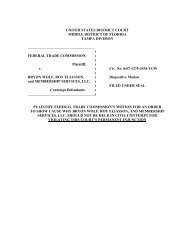Complaint Counsel's Post Trial Brief - Federal Trade Commission
Complaint Counsel's Post Trial Brief - Federal Trade Commission
Complaint Counsel's Post Trial Brief - Federal Trade Commission
You also want an ePaper? Increase the reach of your titles
YUMPU automatically turns print PDFs into web optimized ePapers that Google loves.
262. When enterng in the MA an activity for an herb, Duke only enters references to that<br />
source "as it may be a good source ( or) it may be a bad source." (R 18 (Duke, Dep. at<br />
93)).<br />
263. Duke acknowledged that it is a "gut feeling" on how he makes sure that the studies he<br />
references in the MAs are reliable. (R18 (Duke, Dep. at 108)).<br />
264. Duke acknowledged that his MAs have not been cited in any peer-reviewed joural.<br />
(R18 (Duke, Dep. at 113)).<br />
265. Duke explained that his Indication Evaluations ("IE") is where he has "gone though all<br />
these abstracts over the years (and) I've scored for a given indication. If it's folkore and<br />
that's all I have, it would receive an 't; ifit has a chemcal or an epidemiological or an<br />
anal or an in vitro evidence, I've given it a 1; and then the 2, as we mentioned earlier,<br />
that means it's either been clincally approved - - an extract of the plant has been<br />
clincally approved or it's been approved by the Commssion E or the Traml<br />
Commssion for that indication. These are lines of evidence that point to me which ones<br />
are most important and should be studied for cancer." (R18 (Duke, Dep. at 59, 118-19)).<br />
266. The IE is a "compendium of information." (R18 (Duke, Dep. at 109); Duke, Tr. 526).<br />
267. There is no relationship between the MAs and the IE. (R18 (Duke, Dep. at 92)).<br />
268. Neither the MAs nor the IE reflect information that indicates that tuerc, for<br />
example, is effective in the treatment of cancer. (R18 (Duke, Dep. at 109-10)).<br />
269. Duke has never measured the effcacy of herbs as a treatment for cancer in a controlled<br />
patient population. (R18 (Duke, Dep. at 55)).<br />
270. Duke is not able to express opinons on what the minium dosage would be necessar to<br />
achieve cancer-fighting. (R18 (Duke, Dep. at 67-68); Duke, Tr. 522-23).<br />
271. Duke recognzes the difference between somethg being effcacious in an in vitro study<br />
and somethg being effcacious in human beings. (R18 (Duke, Dep. at 71); Duke, Tr.<br />
523).<br />
272. As a matter of science, Duke does not believe that the herbal extract working in vitro<br />
proves that it would work in a human. (R18 (Duke, Dep. at 77); Duke, Tr. 523).<br />
273. Rather than relyig solely on in vitro studies, Duke recommends "the third ar-tral<br />
where the whole plant or an extract thereof is compared with a competing<br />
pharaceutical." (R18 (Duke, Dep. at 77)).<br />
274. According to Duke, "(t)he thrd ar would compare a given herb with a given<br />
pharaceutical and placebo." (R18 (Duke, Dep. at 81)).<br />
275. Other than the St. John's Wort tral that used a placebo and Zoloft, Duke is not aware of<br />
any other studies where an herb, a pharaceutical, and a placebo were studied in a sideby-side<br />
maner. (R18 (Duke, Dep. at 82)).<br />
26

















